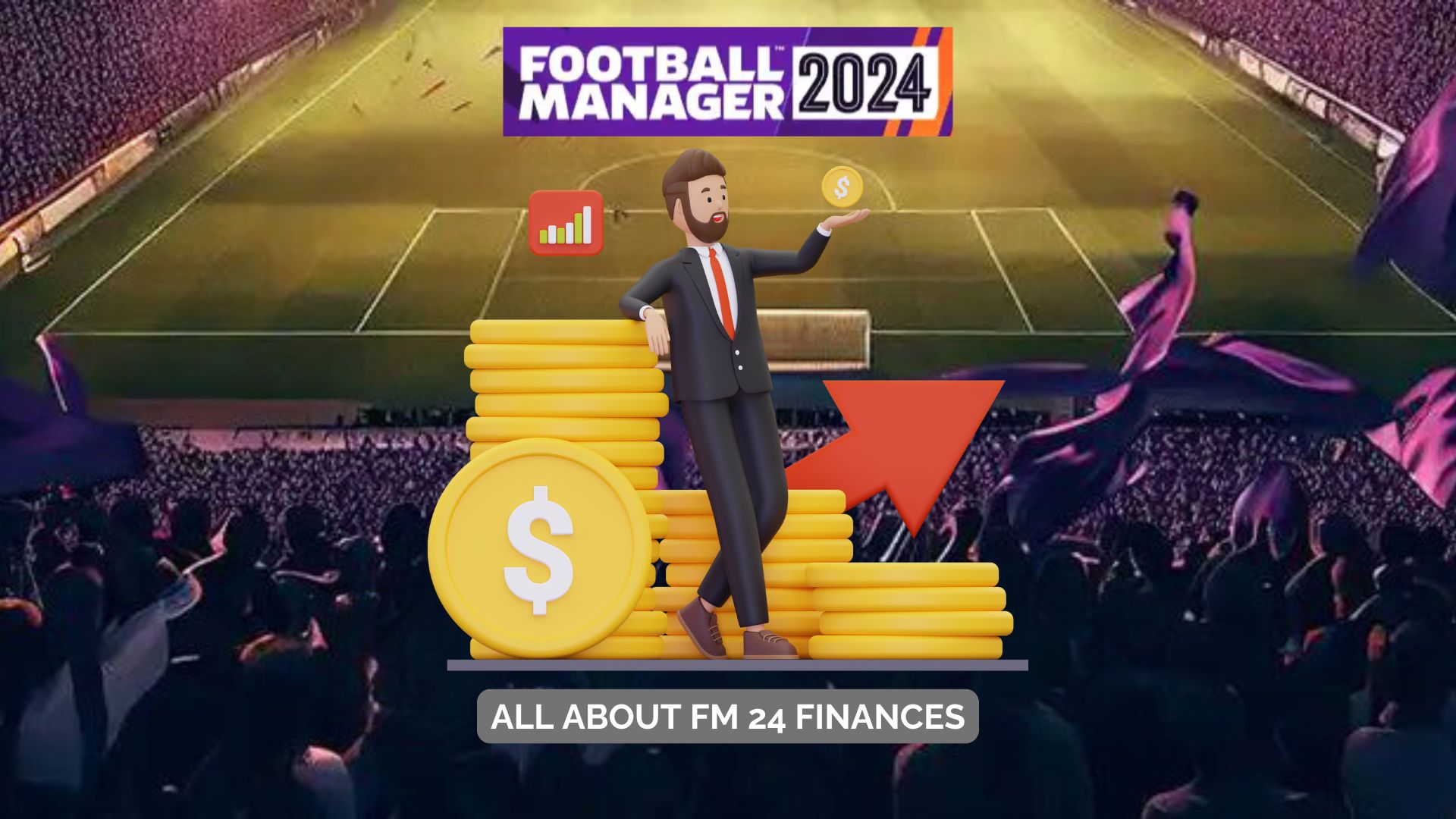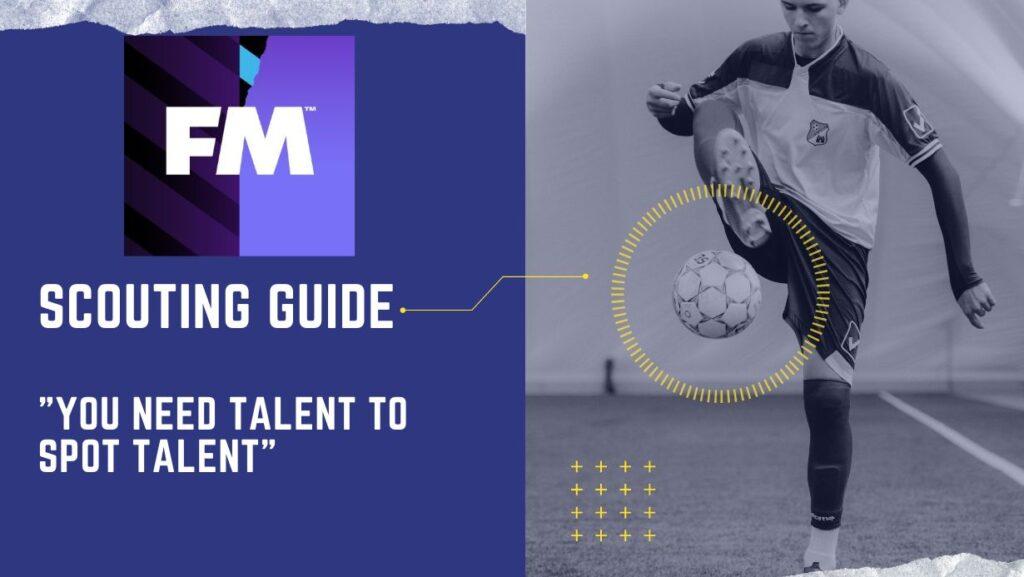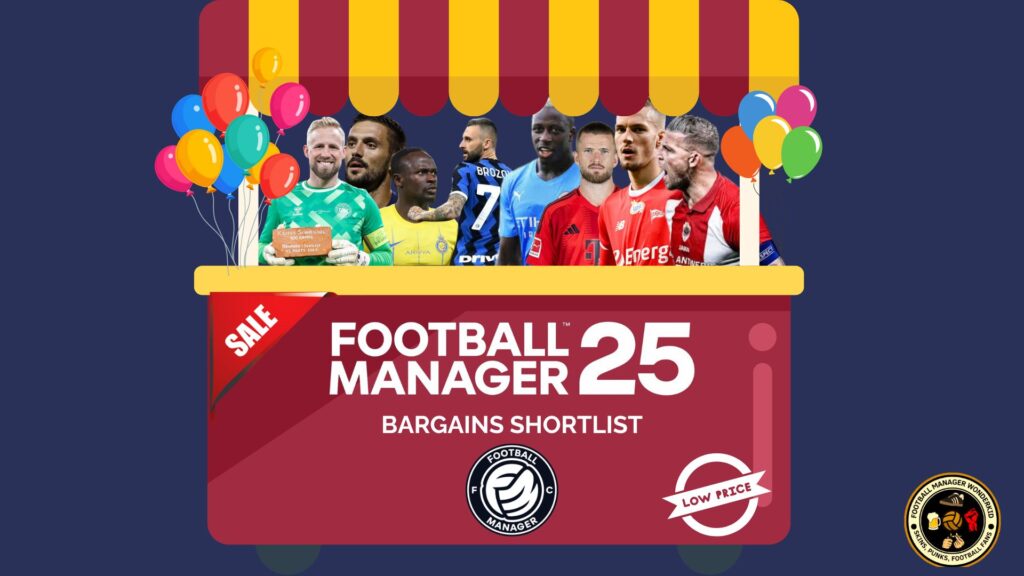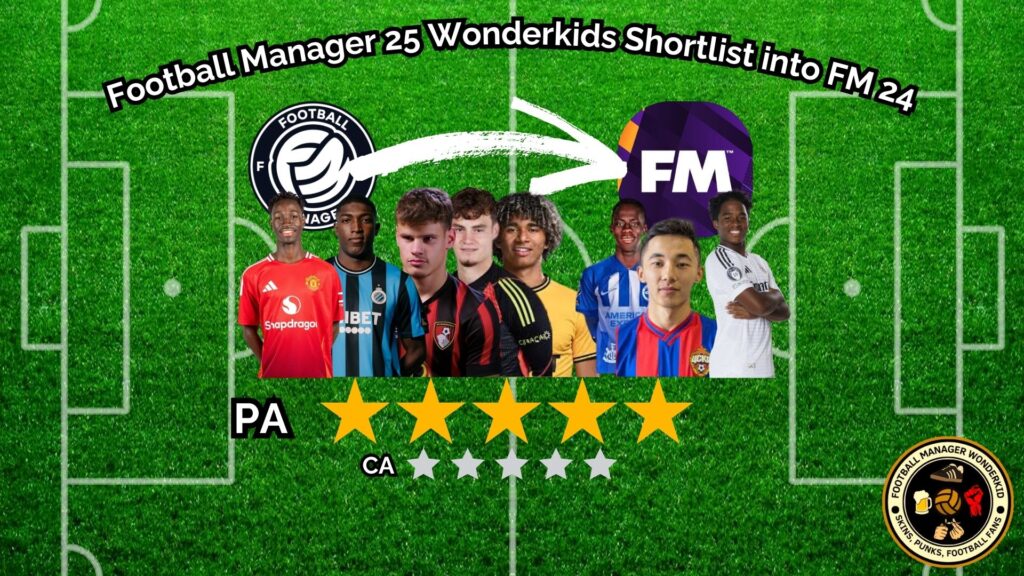We’ll look at 12 key ways to keep your club’s bank account healthy while winning matches. These tips will help you build a strong and successful team, no matter if you’re running a big Premier League club or a small lower league team.
12 Essential Football Manager Finances Strategies
- Master financial overview screens
- Implement smart wage structure
- Excel in transfer market dealings
- Invest in youth development
- Maximize commercial revenue
- Navigate Financial Fair Play regulations
- Utilize loan deals effectively
- Implement smart contract negotiations
- Manage cash flow effectively
- Adapt strategies for different league levels
- Utilize in-game financial tools
- Learn from successes and failures
1. Master the Financial Overview Screens
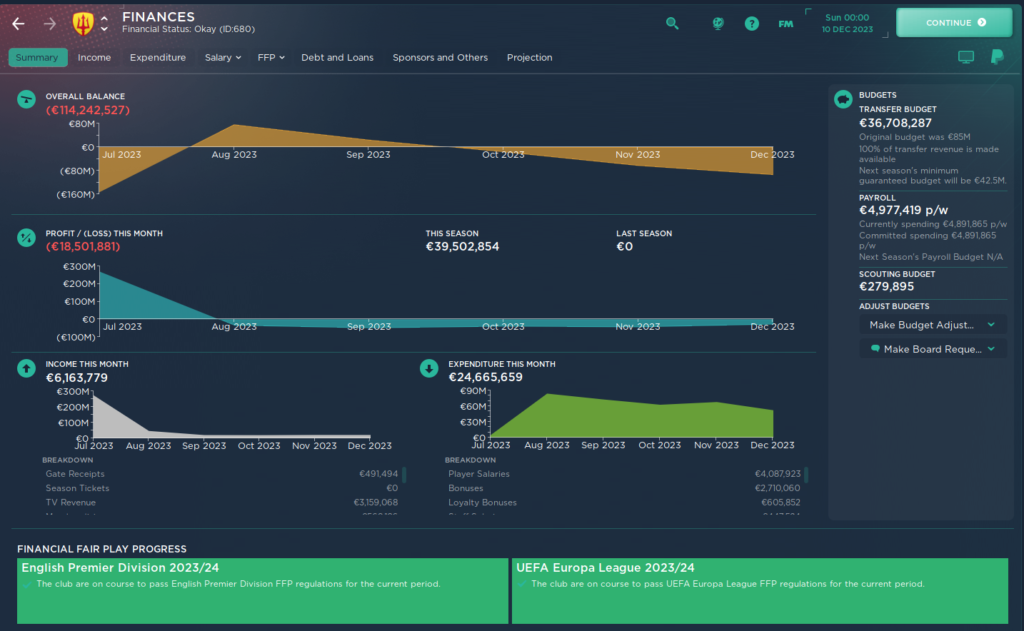
Understanding your club’s money situation is super important. The Financial Overview screens in Football Manager show you all the important information about your club’s finances:
- Summary Screen: This shows you a quick look at how much money your club has and how healthy its finances are.
- Income and Expenditure Breakdown: This shows where your money comes from and where it goes, like ticket sales, player wages, and keeping up the stadium.
- Wages Analysis: This shows how much you’re paying players and staff, including bonuses.
- Debt and Loans Overview: This shows any money your club owes and when it needs to be paid back.
Take time to understand these screens. They’re not just boring numbers – they’re like a map to help your club make money. Looking at these numbers often will help you spot problems early and make smart choices about things like buying players and giving out contracts. Our Football Manager Guide for Beginners can help you understand these screens better.
2. Implement a Smart Wage Structure
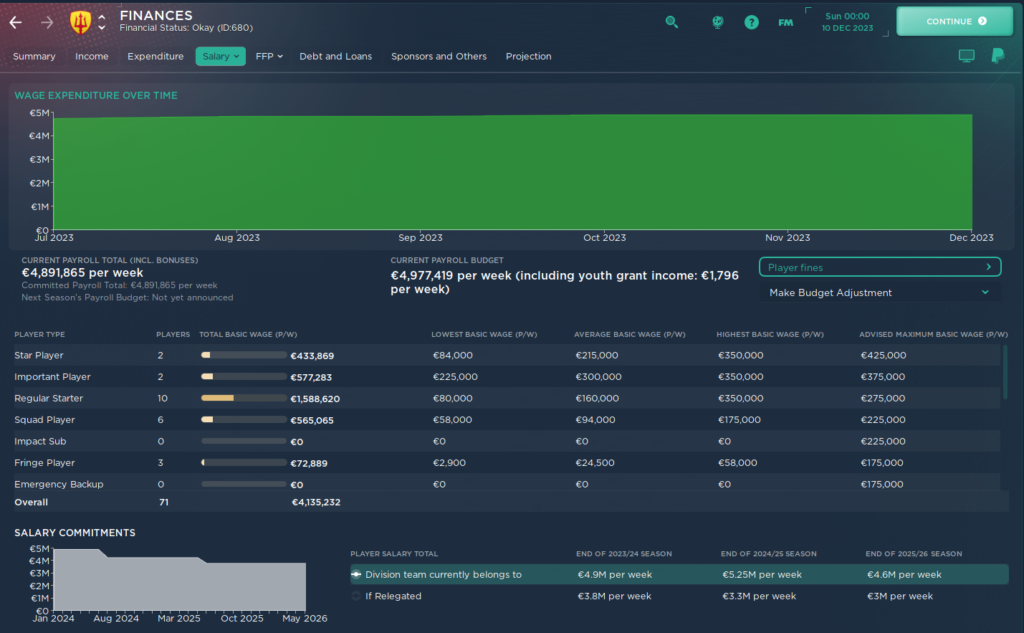
Having a good plan for how much you pay players is crucial. Here’s how to do it well:
- Set clear wage limits for different types of players: This helps keep things fair and stops wages from getting too high.
- Use bonuses to reward good play: This can motivate players without having to pay them too much every week.
- Be careful with long contracts for older players: Older players might not play as well after a few years, so be careful about promising them lots of money for a long time.
- Check and update your wage plan regularly: What’s a good wage one year might not be enough the next, so make sure to look at this often.
Remember, keeping your wage costs under control gives you more money to buy new players and helps you follow the rules about spending. It’s tricky to balance paying players enough to keep them happy while also not spending too much, but getting it right can help your club do well.

3. Master the Transfer Market
Being good at buying and selling players can make a big difference to your club’s money. Here’s how to do well in the transfer market:
- Look for good players that don’t cost too much: Sometimes you can find great players in smaller leagues or players who aren’t happy at their current club.
- Use clever clauses in contracts: Things like getting a percentage of a future sale can help you make more money later.
- Try loaning players before buying them: This lets you see if a player is good for your team before spending lots of money on them.
- Be ready to sell your best players if you get a really good offer: Sometimes selling one great player can give you money to make your whole team better.
Our guide on Football Manager Scouting can help you find great players without spending too much. It talks about how to find bargains and set up a good scouting network.
4. Invest in Youth Development
Helping young players get better can make your team stronger and help you make money. Here’s how to do it well:
- Spend money on good training grounds and coaches for young players: This can help you produce better players over time.
- Look for talented young players all over the world: Don’t just look in your local area – great young players can come from anywhere.
- Give young players a chance in the first team: This can help them get better faster and make them worth more money.
- Use loans to help young players improve: Sending young players to other clubs can give them more experience and make them better players.
Having a good youth system can give you players for your team or players to sell for lots of money. It takes time to see results, but it can help your club in the long run.
5. Maximize Commercial Revenue
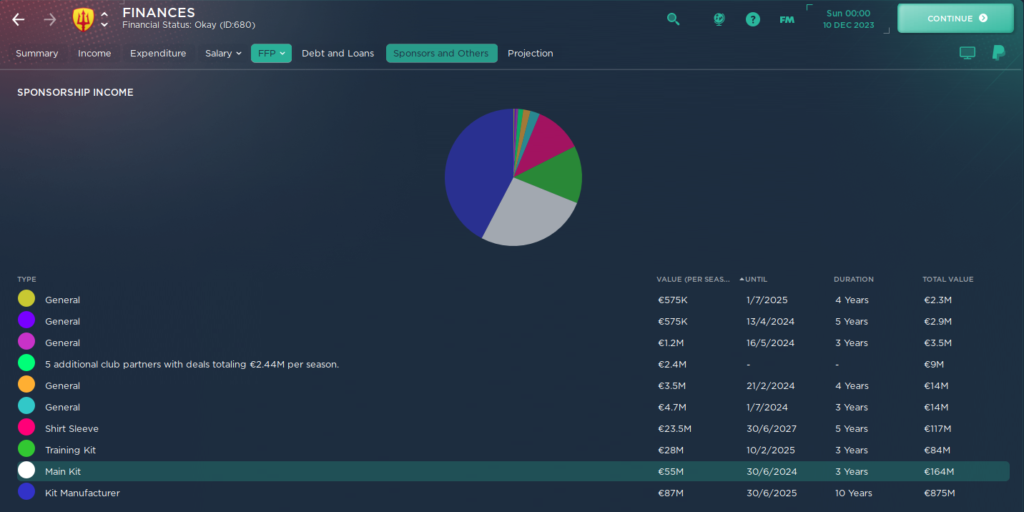
Making money off the pitch is important for keeping your club healthy. Here’s how to make more money from things other than just playing matches:
- Get good sponsorship deals: Try to get new deals after your team has done well or been on TV a lot.
- Sell more club merchandise: In the game, you might be able to ask to sell new types of club stuff or agree to let other companies use your club’s name.
- Make your stadium bigger or better: If your stadium is always full, you might want to add more seats. Better seats and boxes can also help you make more money per person.
- Plan good pre-season tours and friendly matches: Going to countries with lots of fans or playing against famous teams can help you make money and get more fans.
Remember, doing well in matches often means you can make more money off the pitch too. More fans, better sponsorship deals, and selling more club stuff all come from having a good team. But it’s important to have a strong plan for making money even when the team isn’t doing as well.
6. Navigate Financial Fair Play (FFP) Regulations
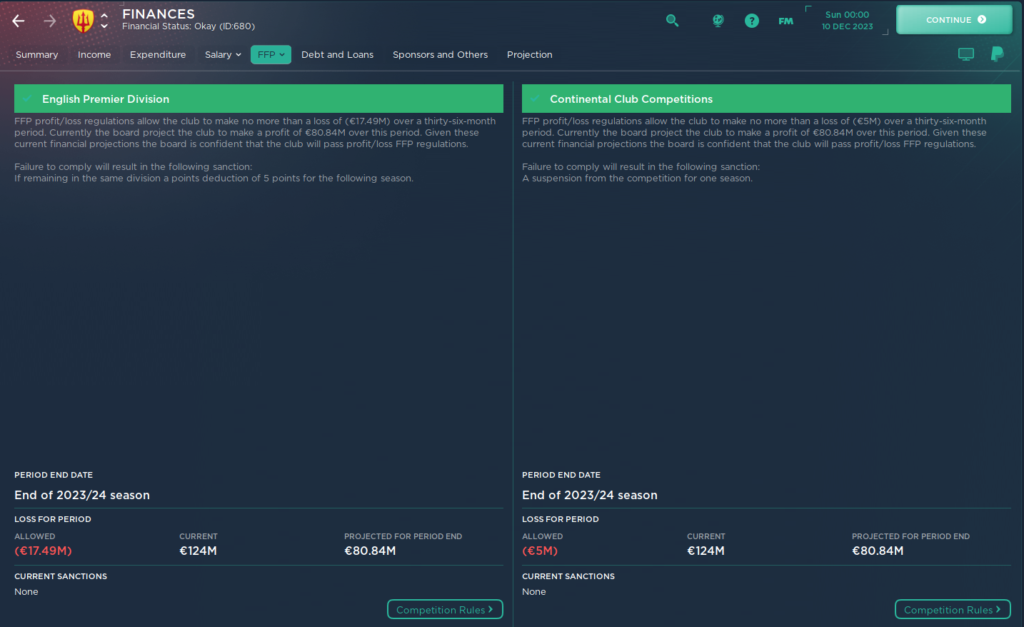
Understanding and following Financial Fair Play (FFP) rules is important to avoid trouble and keep your club stable. FFP rules are there to stop clubs from spending way more money than they make. Here’s how to handle these tricky rules:
- Keep an eye on how your club’s money situation compares to FFP rules: Check your FFP status in the game’s money screens often.
- Plan your spending on players and wages with FFP in mind: Before spending lots of money, think about how it will affect your FFP status.
- Think about how long contracts affect FFP: They can spread out transfer costs, but they also mean you’re promising to pay wages for a long time.
- Use player sales and loans to balance the books if needed: If you’re close to breaking FFP rules, selling valuable players or loaning out expensive ones can help quickly.
Staying within FFP rules means your club can play in competitions and avoid getting fined. It’s tricky to balance wanting to have a great team with following the rules, but getting it right is key to doing well as a Football Manager for a long time.
7. Utilize Loan Deals Effectively
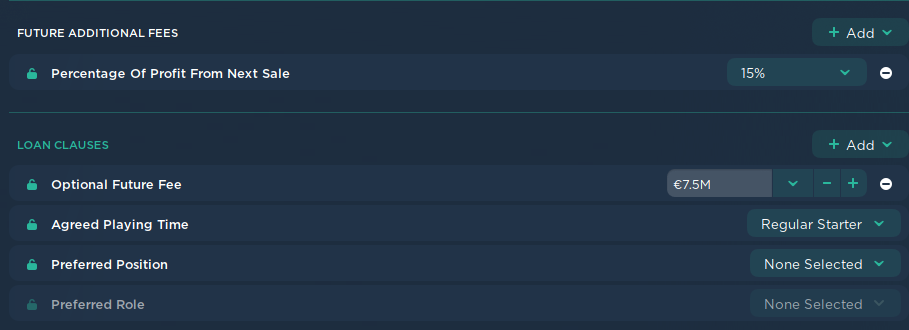
Loan deals can be really useful for managing money and helping players get better in Football Manager. Here’s how to use loans well:
- Loan out players you’re not using to save on wages: If you have players who aren’t playing much, loaning them out can save you money on their wages.
- Use loan-to-buy options to try players before buying them: This lets you see if a player fits well with your team before spending lots of money on them.
- Try to get good deals when bringing in loan players: When you’re loaning players in, try to get the other club to pay some of their wages.
- Keep an eye on how your loaned-out players are doing: If they’re playing really well, you might want to bring them back to help your team or sell them for more money.
8. Implement Smart Contract Negotiations
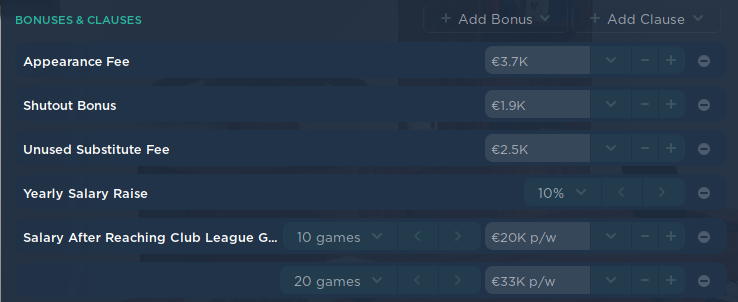
Being good at negotiating contracts can save your club lots of money over time. Every contract you agree to affects your club’s finances for a long time. Here’s how to negotiate contracts smartly:
- Offer contracts with bonuses for good performance: This means you can reward players for playing well without having to pay them lots of money all the time.
- Use appearance fees and clean sheet bonuses for defenders and goalkeepers: This encourages them to play well and can be cheaper than paying high wages all the time.
- Include clauses that reduce wages if the team gets relegated: This helps protect the club if things go badly.
- Be careful with long contracts for older players: Older players might not play as well after a few years, so be careful about promising them lots of money for a long time.
Every contract you agree to affects your club’s money for a long time. It’s not just about getting a player to sign – it’s about doing it in a way that’s good for the club’s finances and goals. Trying to keep players happy while also being careful with money is key to doing well as a Football Manager.
9. Manage Cash Flow Effectively
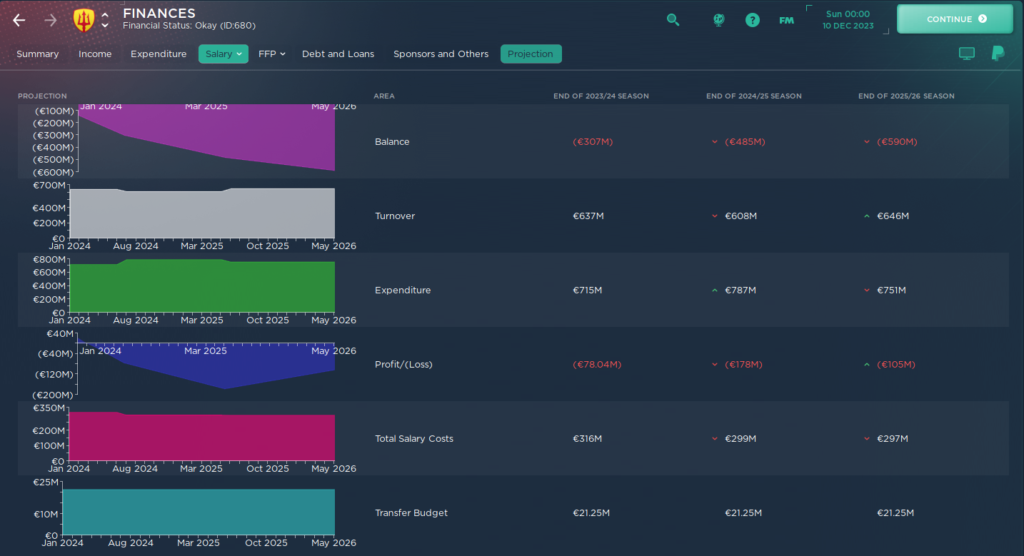
Keeping a positive cash flow is important for running your club day-to-day and keeping it healthy in the long run. Good cash flow management means your club can pay its bills, buy players, improve facilities, and handle unexpected money problems. Here’s how to manage your cash flow well:
- Keep a close eye on how much money is coming in and going out each month: Check your financial statements often to understand when you get money and when you have to spend it.
- Plan for times when you’ll have less money coming in: Football clubs often make more money at some times of the year than others. Save money during good times to help during quieter periods.
- When buying players, try to spread the cost over several years: This can help keep your cash flow healthy by avoiding spending lots of money all at once.
- Be careful about taking out loans: Loans can give you money quickly, but you have to pay them back with interest. Only use them when you need to and have a clear plan to pay them back.
Good cash flow management means you can pay your bills and take advantage of opportunities when they come up. It gives you the flexibility to buy players, invest in young talent, or improve your facilities without putting the club at financial risk.
A club with good cash flow is better able to handle money problems and take advantage of unexpected changes in the transfer market.
10. Adapt Strategies for Different League Levels
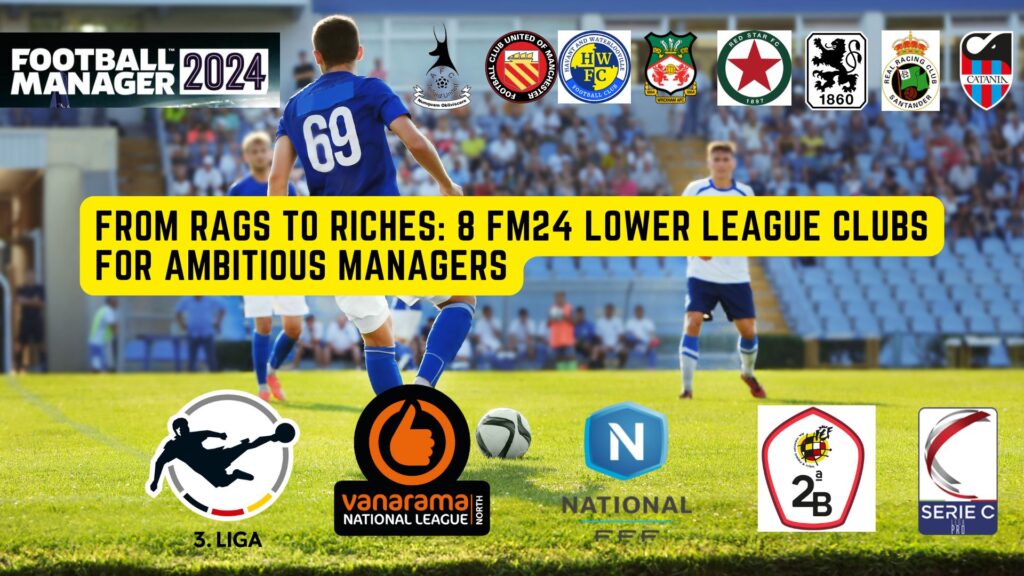
Managing money in Football Manager is different depending on what league your team is in. What works for a big Premier League team won’t work for a small team in League Two. Here’s how to change your approach based on your league:
- Lower leagues: Focus on free transfers, loans, and developing young players. In lower leagues, you don’t have much money to spend. Look for players you can sign for free and use loans to get good players temporarily. Spend time and money on developing young players – this can be a cheap way to improve your team and maybe make money by selling them later.
- Mid-table clubs: Try to balance improving your team with keeping your finances stable. For teams in the middle of the league, the goal is often to try to qualify for European competitions or avoid relegation. Look for good players that aren’t too expensive, and consider selling your best players if you get a really good offer – you can use that money to improve several positions in your team.
- Top clubs: Manage high wages and transfer fees while trying to make as much money as possible from things like sponsorships and merchandise. At the top level, you’ll be dealing with star players who want high wages and cost a lot to buy. Focus on making money from things like sponsorships, ticket sales, and selling club merchandise. Be ready to spend big money on players, but always keep in mind the FFP rules and think about the long-term financial health of the club.
Always think about your club’s current financial situation, position in the league, and long-term goals when making financial decisions. What works for one club might be a disaster for another.
11. Utilize In-Game Financial Tools
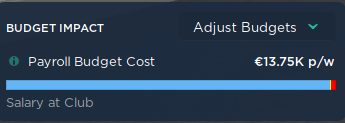
Football Manager has lots of useful tools to help you manage your club’s money. Understanding and using these tools can help you keep your club’s finances healthy and make smart decisions. Here’s how to use the in-game financial tools:
- Use the salary cap function to control how much you spend on wages: This tool lets you set a maximum wage for different types of players. It helps stop wages from getting too high and keeps your wage structure fair.
- Regularly check the financial overview for predictions and warnings: This screen shows you a complete picture of your club’s finances, including how much money you expect to make and spend. Pay attention to any warnings about possible money problems.
- Use the transfer budget adjustment slider to balance money for buying players and paying wages: This tool lets you decide how to split your money between buying players and paying wages. Adjusting this can help you fine-tune your financial strategy based on what your team needs right now.
- Pay attention to what the board thinks about your financial management: The game will tell you if the board is happy with how you’re managing the club’s money. This can help you understand what areas you need to improve and what the board thinks is most important.

Getting good at using these tools will give you more control over your club’s finances and help you make better decisions in all parts of managing your club.
12. Learn from Financial Successes and Failures
One of the most important skills in Football Manager is learning from both your successes and mistakes, especially when it comes to managing money. Looking at your decisions and what happened because of them can help you get better at managing finances and avoid making the same mistakes again. Here’s how to learn from your experiences:
- Look back at times when you managed money well in previous games: Think about what financial decisions helped you do well. Was it a certain way of buying and selling players, how you structured wages, or how you made money from things like sponsorships?
- Learn from mistakes and change how you do things: Don’t be afraid to look at times when things went wrong. If buying an expensive player didn’t work out or a financial risk didn’t pay off, try to understand why and how you can avoid similar problems in the future.
- Look at how real football clubs manage their money for ideas: While Football Manager is a game, many of its financial rules are based on real life. Reading about how successful real clubs manage their money can give you good ideas for your game strategy.
- Try different ways of managing money in different scenarios: Don’t be afraid to try new strategies, especially in games that aren’t as important to you. Experimenting with different approaches to buying and selling players, structuring wages, or making money from things like merchandise can help you discover new effective strategies.
Always learning and adapting is key to long-term financial success in Football Manager. The game’s economy is complex and always changing, and what works in one game might not work as well in another. By carefully looking at your decisions and what happened because of them, you can develop a deep understanding of football finances that will help you in all your Football Manager games.
Smart Football Manager Finances: Powerhouse Building
Getting good at managing money in Football Manager is tricky but rewarding. It needs you to think ahead, plan carefully, and be ready to change your plans. By using these 12 strategies, you’ll be well-prepared to build a club that’s financially stable and successful on the pitch, no matter where you start or what your long-term goals are.
Remember, every decision you make in Football Manager affects your finances, from buying and selling players and negotiating contracts to improving facilities and making commercial deals. Always think about how your choices will affect the club in the long run and how they fit with your overall strategy for the club.
Good luck, managers! May your bank balance be as impressive as your trophy cabinet!

